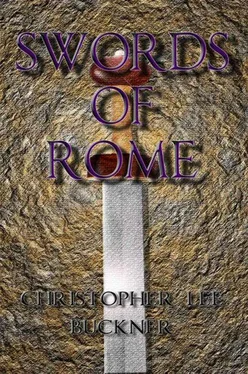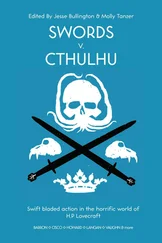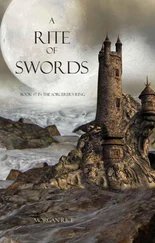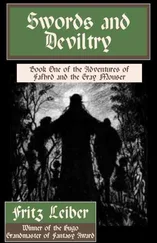Christopher Buckner - Swords of Rome
Здесь есть возможность читать онлайн «Christopher Buckner - Swords of Rome» весь текст электронной книги совершенно бесплатно (целиком полную версию без сокращений). В некоторых случаях можно слушать аудио, скачать через торрент в формате fb2 и присутствует краткое содержание. Жанр: Исторические приключения, на английском языке. Описание произведения, (предисловие) а так же отзывы посетителей доступны на портале библиотеки ЛибКат.
- Название:Swords of Rome
- Автор:
- Жанр:
- Год:неизвестен
- ISBN:нет данных
- Рейтинг книги:3 / 5. Голосов: 1
-
Избранное:Добавить в избранное
- Отзывы:
-
Ваша оценка:
- 60
- 1
- 2
- 3
- 4
- 5
Swords of Rome: краткое содержание, описание и аннотация
Предлагаем к чтению аннотацию, описание, краткое содержание или предисловие (зависит от того, что написал сам автор книги «Swords of Rome»). Если вы не нашли необходимую информацию о книге — напишите в комментариях, мы постараемся отыскать её.
Swords of Rome — читать онлайн бесплатно полную книгу (весь текст) целиком
Ниже представлен текст книги, разбитый по страницам. Система сохранения места последней прочитанной страницы, позволяет с удобством читать онлайн бесплатно книгу «Swords of Rome», без необходимости каждый раз заново искать на чём Вы остановились. Поставьте закладку, и сможете в любой момент перейти на страницу, на которой закончили чтение.
Интервал:
Закладка:
“Neither of us can afford to be so naive, Julia. We have too much to lose.”
“I do not care about all of this,” she cried as she flung her hands out.
Gaius took Julia’s hands and held them in his as he spoke quietly.
“It is not your wealth or my position that we stand to lose,” he told her.
Julia’s tear-filled eyes opened wide with the sudden realization of what he implied.
“My father would never…”
Gaius shook his head.
“Perhaps, or possibly not, but no matter, we have betrayed his trust. Even if he took no stand against us, Paullus would, and if it wasn’t our lives that he demanded for the embarrassment, he could hold your father accountable for betraying his word in promising his daughter to him. He could ruin your whole family.”
Julia tried, wanted to rebuke him. She desired to insist that Paullus was not that kind of man, but Gaius didn’t have to know him intimately to understand that Paullus cared for her deeply.
Gaius wondered if the arrangement in taking Julia’s hand in marriage wasn’t just a play to join two powerful families. Perhaps the man actually loved Julia as much as he. A man like that could be unpredictable, most of all a man who had the means to reshape Rome, no less the lives of two individuals.
“I do not like this, Julia. I do not wish this. I want you. I want you by my side, for as long as I live. I wish we were different people, not obligated by our duties, to even be slaves, perhaps, free to love one another without reserve. However, it isn’t so. Our world and our place in it, is not that simple.”
Gaius reached for Julia, taken hold of her as she lowered her head, resting it against his chest.
“I will love you forever, for as long as I draw breath. My heart will always beat for you and you alone. Nevertheless, I cannot give you anything more.” Those were the last words Gaius spoke to Julia, as she pulled away from him.
He watched her as she stepped through the threshold and back into her house. She turned only once; tears filling her eyes as she looked out to him. He wanted to say more, but there was nothing else to be said. Nothing could ease the suffering that they were both going through, so he left her, wondering if he would ever see her again…if she would forgive him?
CHAPTER EIGHTEEN
Snow drifted in thick clumps between the Roman lines, which advanced along the banks of the nearly frozen Trebia River. Even with the bitter cold and long marches, Gaius’ thoughts continued to drift back to Julia, and the last day he saw her, now six weeks past. He doubted the memories of that day would ever leave his troubled mind — how he wished he could have had a second chance to speak different words to Julia, to make her understand that he wasn’t abandoning her, or that he didn’t love her with all his heart, but what had been said was done, and nothing could remove the stain.
Gaius was now occupied by the duties he had been trained to carry out. However, unlike the rest of his cohort, who were excited by be given the chance to avenge their falling brothers, he felt like a corpse, still breathing, but dead inside. The joy and anticipation of the coming battle did not echo in his heart. However, for weeks now, Hannibal continued to elude his pursuers despite attempts to draw him out into a pitched battle. The legions under the command of Consul Sempronius were close to him, nipping at Hannibal’s heels, but with their numbers, superior to the Carthaginians, the legions move slower, allowing the barbarian rogue to stay one step ahead of Sempronius.
Sempronius’ legions marched from one burnt-out settlement to another, engaging stray units, mostly Hannibal’s Gallic allies who were more interested in plunder than warfare. However, Hannibal’s seasoned troops — his Carthaginian, Spanish and Numidian allies remained hidden, utilizing the trees and worsening weather as cover. This frustrated the legions, which were growing tired and complacent, most of all the impulsive Sempronius; and now the bitter cold nights were beginning to sap the legions' fighting spirit.
Gaius watched the army arrayed far ahead of him. He feared Sempronius’ eagerness to end the war might be a price too high to pay if things kept going the way they were, a sentiment shared by many officers.
As Gaius marched in the rear of the Roman formation, which moved slowly down the embankment of the Trebia River, his mind still drifted back to Julia. He knew it was wrong to continue to think about her, so he struggled to keep focused with each step he took.
A lingering fantasy played in Gaius’ mind that he could win enough honors in the coming battle he could go back to Rome and demand Varro present Julia to him as a prize, much like his own father won his mother in the previous war with Carthage. However, that fantasy was an illusion, which angered him and made his already cold and restless nights all the more tiresome. It affected his duties as he was quick to anger, snapping at his men when their discipline lapsed for only a moment. He did not like the person that these feelings created. He did not know how to deal with them, but he soldiered on, nonetheless, hoping the pain would go away.
Gaius’ thoughts returned to the reality as his foot kicked over a small stone that rolled down into the cold water.
The pace was unbearably slow, made worse by the snow that blinded the army’s advance. Ahead, Gaius could see through the fog the main formation of Sempronius’ lines. They were only two men across, not ideal for a quick defensive formation if an attack should come from the trees. There was no other choice as the riverbank and the sloping hills, surrounded by thick forest, had forced the legion to travel in a long line.
Gaius glanced over his shoulder, seeing Valerius, who rode on horseback a few paces behind. His old mentor did not look happy. Gaius had never seen him more on the edge as he silently cursed Sempronius’ impatience, despite his warnings that legions should not advance in this manner.
Earlier in the morning the consul summoned all his senior officers to his tent. The legions had been attacked daily since it had camped some miles from their current position days before as Hannibal’s dark-skinned horsemen continued to harass the army’s extensive supply lines, and each time Sempronius sent out his cavalry to confront the Numidians, they broke and retreated. This frustrated the consul to no end. Now, Sempronius was driven by madness as he was determined to find Hannibal and crush his ragged army once and for all, even if it put his whole army at risk.
Gaius knew the moment that he laid eyes on Sempronius this morning that the mad was deathly sick, and clearly not thinking straight. He was running a high fever; however, that fact did not stop him from planning his next move despite the urging of Valerius and a number of other legates.
Sempronius wanted, needed to confront Hannibal, not for the sake of defeating the man, but to return him to his former standing before the eyes of the Roman people and the Senate. He was not the most popular figure in politics, commonly known to all those living in Rome. He spent half his time in Sicily, or in Greece, attending to private affairs in regard to his vast land-holdings and businesses. This made him an easy target for his opponents in the Senate, namely senators such as Varro, who challenged Sempronius on his priorities and conventions to the Roman people. He had only been made co-consul out of desperation after Scipio’s death because of his previous experience dealing with Carthage and the Gauls north of the Po River. Other than that, the Senate would have been content to let him rot somewhere else if there had been a more able man — one that was that actually cared about confronting Hannibal. This battle, despite his early victory was still not one that most senior commander’s saw important for their notice — not enough fame or glory to be had, but, enough for Sempronius.
Читать дальшеИнтервал:
Закладка:
Похожие книги на «Swords of Rome»
Представляем Вашему вниманию похожие книги на «Swords of Rome» списком для выбора. Мы отобрали схожую по названию и смыслу литературу в надежде предоставить читателям больше вариантов отыскать новые, интересные, ещё непрочитанные произведения.
Обсуждение, отзывы о книге «Swords of Rome» и просто собственные мнения читателей. Оставьте ваши комментарии, напишите, что Вы думаете о произведении, его смысле или главных героях. Укажите что конкретно понравилось, а что нет, и почему Вы так считаете.












